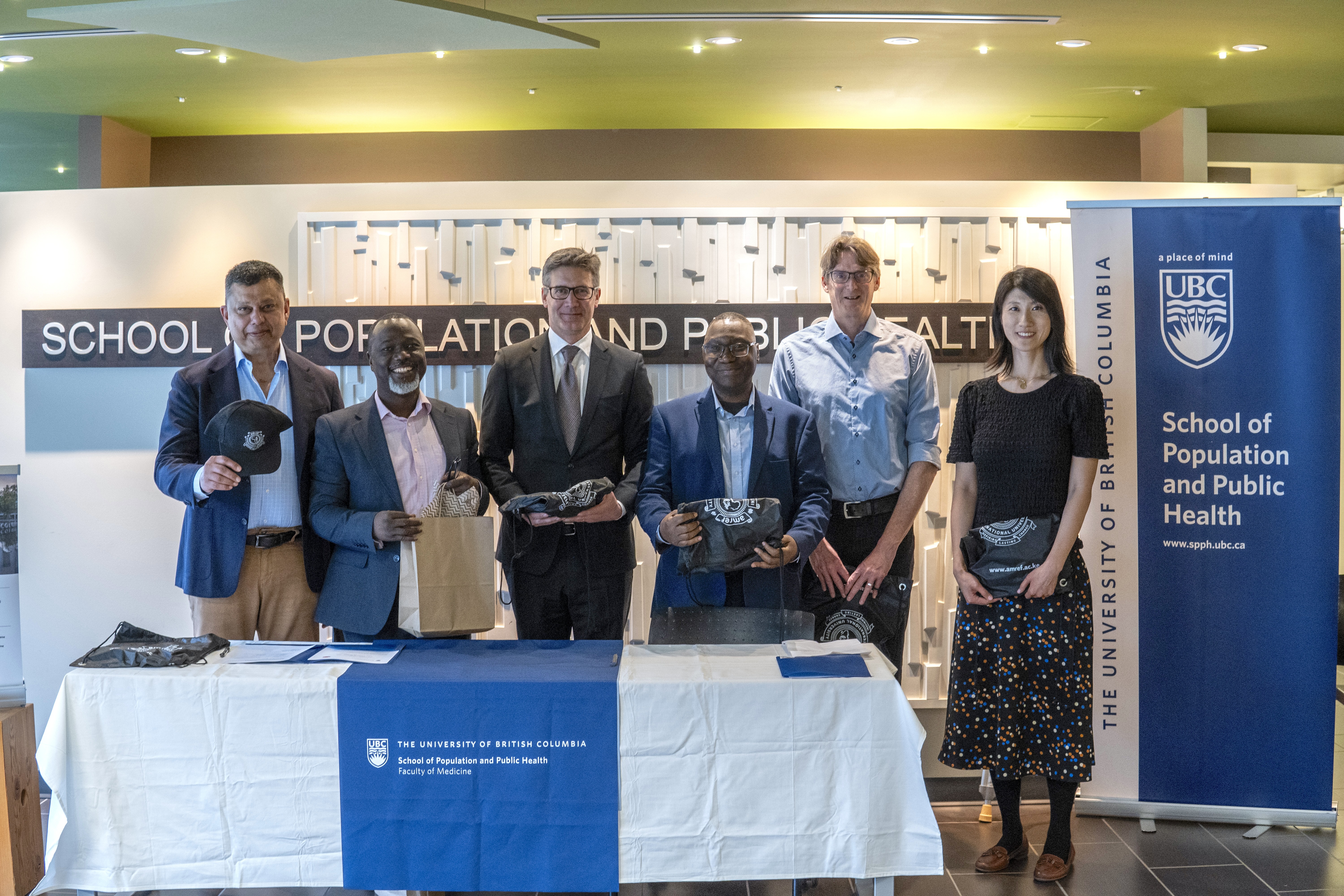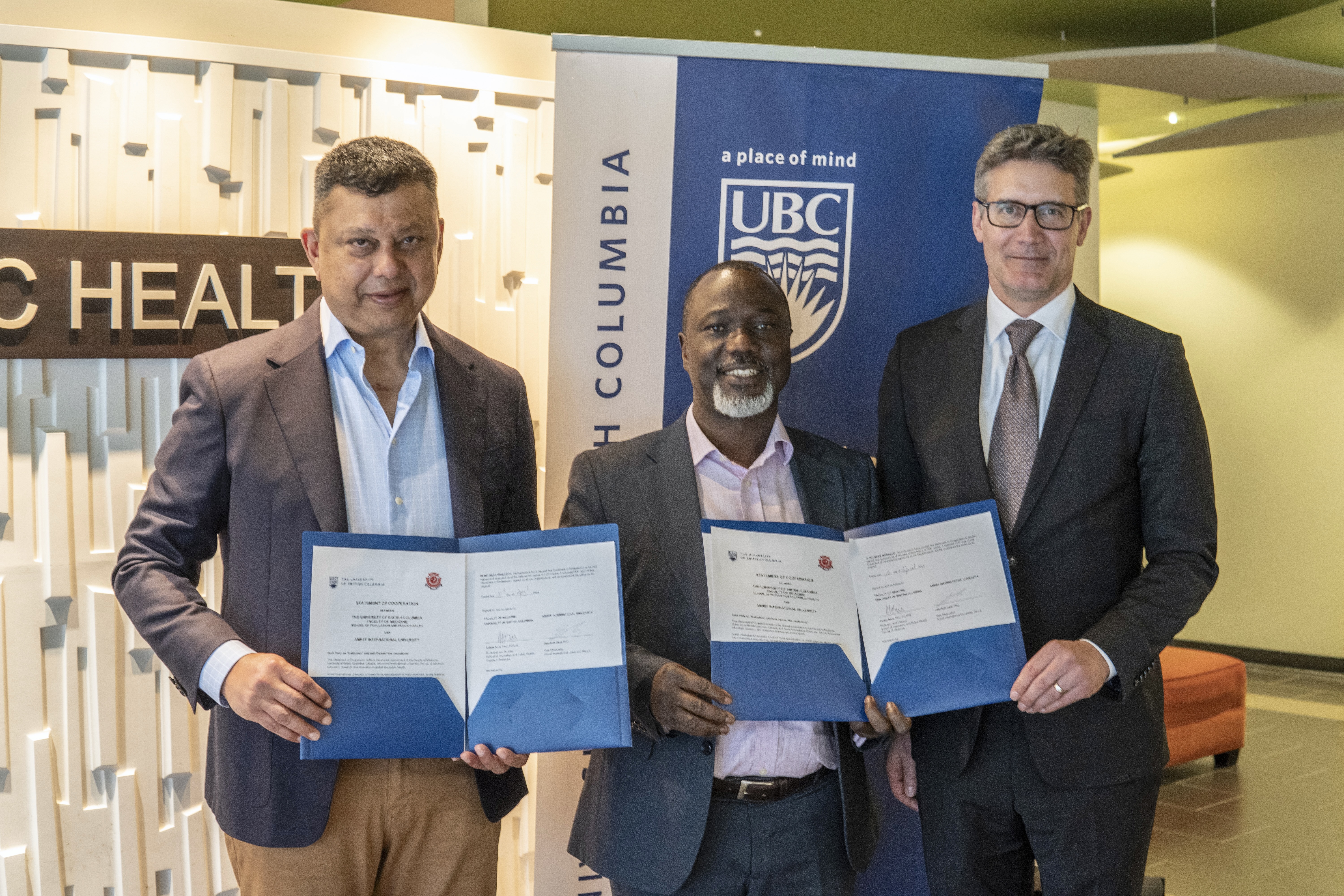A public health crisis that erupts in one corner of the world—say, COVID 19—affects us all in every corner of the world. That’s why it is crucial, the experts say, to “think globally, even as we act locally.”
It is this mindset and approach driving a newly forged Global Health Collaboration between UBC and Africa’s Amref International University (AMIU) in Nairobi, Kenya. The UBC-AMIU pairing is one of six successful recipients announced in March for projects addressing global challenges and promoting sustainable development through collaborative partnerships: Seed Funding for Cooperation with the Global South, funded by UBC Academic Excellence Funds.
The project aims are to establish a long-term, mutually beneficial partnership advancing global health education, teaching and learning at both institutions. Project work will include collaborative research and sharing of technologies, knowledge exchange, faculty and student exchange, face-to-face discussion, interactive seminars, workshops and guest lectures, plus on-the-ground training.
“Disasters here and there affect the health of everyone: When there is a disruption in one part of world, everyone is at risk,” says Dr. Joachim Osur, AMIU Professor and Vice-Chancellor. “This is why we must work together.”

(photo: SPPH Communications)
Dr. Osur travelled to Vancouver April 6 to 12 to tour the campus, sign a Statement of Cooperation and meet his project counterpart, Dr. Khumbo Kalua, Associate Professor and Practicum Director at the Faculty of Medicine’s School of Population and Public Health (SPPH).
As timing would have it, the SPPH has just announced the launch of its new Master of Global Health, western Canada’s only standalone professional global health graduate program. The 20-month interdisciplinary program—delivered in a flexible, multi-access format—is designed to give students the skills and knowledge to meet workplace demands in a globalized world.
We spoke to Dr. Osur and Kalua on the Vancouver campus about their plans and aspirations for their new collaboration.
Dr. Osur, you are here to sign the Statement of Cooperation between Amref and UBC. What else will you be doing during your time here?
Dr. Osur: Mainly, learning about the School of Population and Public Health and what it does: programs, the way you teach, the kinds of students you have and from which parts of the world. I visited St. Paul’s Hospital to see the research and trials UBC is involved in. To have a solid relationship, you need to understand each other. It’s helpful for mapping out intersectionality, areas of collaboration and opportunities for both of us.
Define “global health”? What does the term mean to you?
Dr. Kalua: As a teacher, I get that question all the time. My definition is: issues of importance that affect both the country and outside of the country, extending to relationships between and outside the country.
There was the (outdated) term “international health,” which referred to people from “First World” countries assisting other countries—addressing issues only for low-income countries, but that had the potential to affect all; for example, Ebola, which was very common in West Africa. But if not contained there, with today’s freedom of travelling the globe, Ebola can become a big issue here. COVID 19 started in one place, but affected the entire world. There’s the issue of planetary health: impacting one area, but it ends up somewhere else. Some might ask, what does this have to do with us in Canada? But these are issues of global importance.
Dr. Osur: Yes, that’s the essence. During COVID, for example, we are not safe until we are all safe. When training people in global health, the main thing is: they should think globally even as they act locally. What we do locally is influenced by what’s happening globally. That’s why it’s so devastating to have the U.S. pull out of the World Health Organization. You can’t have a safe Canada without a safe Asia—we are all interconnected.
Travelling has brought us so close as a global culture: the way we eat, think and live is getting more and more similar irrespective of where we live. Health is influenced by all of these things. We must bring a health perspective into the world in order to make sure we’ll all safe—even thinking beyond COVID to non-communicable diseases, people behaving in an unsafe manner and the way social media can influence all of that. It’s about how to keep people healthy.
“We can fundraise together, and share our human capacity, transfer technology across continents and make the world a better place by working together internationally.”
Dr. Kalua: One of the things we want to collaborate on is global health policy: What shapes policies? What about what is happening right now with North America halting funding for research? What are global health ethics? What environment are we working with? If we don’t control these issues, things can get out of hand quickly.
Dr. Osur: The political environment makes research across the continents very important. We don’t have to reinvent the wheel, though. If things are good in America, things are good elsewhere. So that informs our health interventions. We can also fundraise together, and share our human capacity, transfer technology across continents and make the world a better place by working together internationally.

(photo: SPPH Communications)
What are the top five pressing health challenges across the world right now?
Dr. Osur: Climate change and health is a very big area which requires global attention. In Africa, we talk about infectious diseases being very important. Maternal health has been a challenge. No one should be dying from natural processes, such as pregnancy and childbirth. It’s a big problem in Africa and now the U.S. is starting to see a rise in deaths. This is important for us because it’s a justice issue. We know what to do, and how to treat it, but people still die from it.
Dr. Kalua: There’s the rising of non-communicable diseases: diabetes, for example, and the negative impacts of eating fast food. That’s affecting everyone! There’s also pollution: factories polluting communities and the destruction of the environment. Population growth is now causing global health challenges. There are places where you cannot breathe. These are all issues related to equity. Despite what’s been done, some inequities are growing.
We need to ask: How do we bring in equity into everything we’re doing? How can we have an equity lens? Even within Canada, some populations are left behind. That issue of equity drives the global health agenda. Take a look at local student tuition versus international student fees, which are three times higher. So you get fewer international students and a decrease in equity. If you design a program in a way to attract low-income students that might be from low-income countries, you can factor in, say, 10 percent for scholarships to address that. You have to be aware of inequities through the current system. And that brings up the need to decolonize our systems. We need to always look and ask, is that fair?
Dr. Osur: There are so many issues… right now we cannot avoid talking about security and health with the wars around world, displacement and migration. Whenever we have wars, for example in Ukraine, we cannot vaccinate people. In places such as Sudan and the Congo, we are no longer controlling the diseases controlled by vaccinations. And because of travel around world, we are all unsafe.
“When training people in global health, the main thing is: they should think globally even as they act locally.”
Can you outline this project’s particular aims?
Dr. Osur: To enrich issues in global health: work together, share knowledge, learn as faculty. We hope to get joint grants and involve students, do research together, and have students as part of that. You cannot train a global health professional and confine them to working in Canada. You must send them out in the world to visit one or two places to internalize those experiences and enhance the knowledge they get in class. In terms of faculty, getting perspectives from different places helps them to see what we are trying to achieve in global health.
Dr. Kalua: I am guided by the curriculum. The practicum is a key aspect, and how the course aligns with sending students outside of Canada. When students are doing their master’s, how do we put them into real-world settings and expose them to issues? The practicum is a priority because they can go see these health challenges taking place, which results in greater understanding.
What are the synergies between UBC and AMIU in this particular area?
Dr. Osur: AMIU is owned by Amref Health Africa, a pan-African health program working with communities in Africa since 1957 in places where there is war, low-income and climate-impact issues. The university is grounded on community public health, but also connections globally. It’s a rich ground for learning, and the aims of this program can be achieved when we expose students to this work. Our university is very young; only nine years old now. UBC being what is, it is a great benefit for us to learn from an established institution how to scale up.
Dr. Kalua: AMIU is young, expanding and has ambitions to have their own master’s in global health. Amref has been working for 60 years in community health. It has a big fundraising office in Toronto, so has a presence in Canada already. Amref goes into conflict zones with the Flying Doctors Program based in Kenya. They go into rural areas, fly in and do surgeries. That is very attractive to us: bringing in help where it’s most needed. To take students from the classroom to real experiences, an organization such as this one is useful. We will be able to send our students for six or eight weeks. They learn from us, and we learn from them.
What do you hope to get from the project? What does success look like?
Dr. Kalua: For me, seeing activities translated into action: to see one or two students come back here and say, having seen what I saw there, I now want to be a global health expert.
Dr. Osur: Success would be impacts that create tangible changes in global health. We need effective solutions and a network of professionals connecting across the world. I hope some of these students can solve some of these global challenges—for the benefit of all of us, everywhere in the world.
Find out more about UBC Faculty of Medicine’s new Master of Global Health in the School of Population and Public Health
Read about UBC’s global partnerships.
